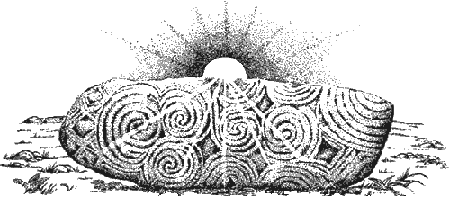Music

While music may seem like something so simple, something always in the background, that can be soothing or uplifting. Depending on the tempo, music can make our heart pound, or calm us, change our mood, reverberate within our bodies. When you think about it music is primally intertwined to human ritual, religion, healing and consciouness.
Even the big bang created sound waves...and has the power to shift our brainwaves and our DNA. Our ancestors knew of the power of sound as a creational force, megaliths as far back as the Neolithic building incredible temples or stone monuments like the Hypogeum, Hagar Qim, Stonehenge, Newgrange, Gavrinis, Gobekli Tepes. Many megalithic passage tombs in Malta, Turkey, Wales, Brittany, France, Britain, Scotland, and Ireland contain spirals carved that many believe to be sound waves. Recent archaeoacoustic studies have proved that these sites had sound in mind for their creation, and through the amplification of sound the rituals can create shifts in consciousness, or even hallicunations from the power of resonance.
Beginning with the human voice itself, from telling oral histories, sharing incantations, or celebrating the seasons with song, our ancestors used sound in many ways. The first musical instruments in the Paleolithic age were used by Neanderthals were flutes made of bone, found in many funerary offerings. Other ancient instruments were skin drums, conch shells, rattles, didgeridoos, and later bagpipes: Sonic rituals were used to declare battle like the Maori "haka" or war dance to intimidate their enemies, or by shamans to heal the sick, by bards to carry on oral histories, announce a birth, a marriage, or a coronation, or guide a tribe member to the Otherworld.
A few facts:
-Sound has been proven to change the shape of water molocules.
-Our bodies are comprised of mostly water and water is an amplifier of sound.
-The human coclea is a wonder of evolution and is shaped like a spiral.
There are some fascinating books on the subject, from Musicophilia: Tales of Music and the Brain by Oliver Sacks. Sacks says the "activation of the motor cortex and of the subcortical systems in the basal ganglia and cerebellum when subjects tapped or made other movements in response to music." It seems part of our DNA, our being to move to the music, we cannot stop ourselves, the waves of sound actualy act like waves of water that move our bodies on a cellular level.
In Daniel J. Levtin's This Is Your Brain On Music: The Science of a Human Obsession.
Levtin states that "When we listen to music we are actually perceiving multiple attributes or dimensions. Among these includes tone, pitch, timbre, loudness, tempo, rhythm, an contour." He discusses the primal brain, called the cerebellum Latin for "little brain" our actual reptillian brain which is responsible for the interconnectedness of emotion and movement via oscillation and pleasure.
"the cerebellum is on of the oldest parts of the brain, evolutionarily speaking. In popular language, it has sometimes been referred to as the reptilitan brain...The function of this oldest part of the brain is somthing that is crucial to music: timing."
FROM Hinduism Today's website: realating to Pythagoras, Mysticism & Music:
The Kosmos
From this comprehensive vision emerge all the details of Pythagorean philosophy. From the vision itself comes a central idea--Kosmos. The word was coined by Pythagoras, and its original meaning was more than merely everything that exists. The Greek root of the word also gives us the word cosmetic. It implies beauty, adornment, an aesthetic component that springs from an inherent order that Pythagoras described by the term Harmonia, the divine principle that brings order to chaos and discord. This order also expresses itself as philia, love or friendship. For Pythagoras, philia was a cosmic force that attracts all the elements of nature into harmonious relationships. It helps preserve the order of planets as they move across the sky, and encourages men and women, once their souls have been purified, to help one another. The greatest love, philia, for the Pythagoreans was wisdom, sophia. Thus Pythagoras was the first Western philosopher (philia + sophia).
Just as was thought in India, Pythagoras taught that, different songs and modes were appropriate to different hours and seasons. In the spring, for example, he would arrange a ritual in which a group of disciples would sit in a circle with a lyre player seated in the middle. As the instrumentalist produced a melody, the others would begin to sing together in a spontaneous fashion, from which would emerge a song in unison, creating a powerful sense of joy. This ritual was also modified for use as a medicine to treat diseases of the body. Many stories have been handed down that illustrate Pythagoras' influence through music.
"Music is the language of languages.
It can be said that of all the arts, there is none that
more powerfully moves or changes the consciousness."
-David Tame, The Secret Power of Music.
Regarding cymatics:
"Music, in the absolute sense, is the invisible geometry of the cosmos, a delicate tracery of frequencies that harmonise with each other and from which all matter manifests. The conductor of this sublime symphony is the Creative Force of the cosmos, some people prefer to say: God. Music, as sensed by humans, is a delicate tracery of audible frequencies that harmonise with each other and generally please our emotions. What is not commonly known is that music has the almost magical power to create form from formlessness. "





© Copyright 2019 by Carmen Zavislake. Proudly created with Wix.com